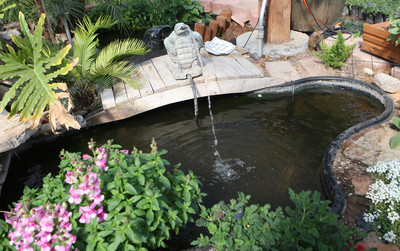AQUATIC SOUL SOOTHERS

Everyone wants to sit by a lake and enjoy the magical sound of water lapping onto the beach. But this is Southern Nevada and the nearest beach is at Mandalay Bay. So do the next best thing — bring the water to you via a backyard water feature.
Whether it’s a dramatic waterfall or a quiet garden pond, water can work its magic by providing a dramatic focal point that soothes the soul. It might even mask a little traffic noise. Also known as aquatic gardens, these features are usually man-made and typically combine a pool with aquatic plants and occasionally ornamental fish. Fixed items such as rocks, fountains and waterfalls can be added for visual interest.
Frank Rauscher, staff horticulturist at Star Nursery, said people continue to buy and build these water elements but not to the extent that they did six years ago.
“Water conservation is a major issue here and homeowners aren’t as free with their water as they used to be,” he said. “But there are still many ways to build them that don’t require a lot of water. The self-contained fountains that we carry in our stores have low volume water circulation so there isn’t a lot of splashing which cuts down on evaporation. Even the size of the pond area is smaller from the larger fountains that are about 3 feet across.”
According to J.C. Davis, public information coordinator for the Southern Nevada Water Authority, stand-alone ceramic or copper fountains or moderate tranquility ponds are not the problem.
“We often find individuals who decide to build a giant pond and stream and that’s in violation of today’s water standards,” he explained. “We know this because a large project like I just described requires a local municipality building permit and that’s a violation of the water restrictions we’re trying to enforce.”
Over at Star Nursery, Rauscher advises homeowners do a little homework before impulsively buying something that looks good in the store display: Take the time to do a site analysis, create a plan, select the type of pond and water features, and determine how much maintenance is associated with your final decision.
“Knowing exactly what you want is the best way to shop,” Rauscher said. “I would suggest that you really study your yard and notice nice views or bad views or areas of high use. Also, check out sun angles. See how the pond might affect the chosen location when compared to the rest of the yard. Are there any children or pets that should be considered? And remember, if time constraints are a concern, then keep the pond simple.”
Pond water needs to be recirculated (turned) every two hours to maintain oxygen to keep it fresh; otherwise, it can become tepid and sour. So a 500-gallon pond needs a 500-gallon-per-hour pump. To calculate how much water (in gallons) the pond will need, based on a free-formed pond from a liner, multiply length by width by depth by 7.5. For example, a pond that is 8 feet in length, 4 feet in width and 1.5 feet deep would contain 360 gallons.
Waterfalls can be an extension of ponds and a standard $20 pump can send water up about 3 feet to the top of the waterfall. Again, careful design prevents splashing and water loss.
“Plants really add to the beauty and tranquility of the pond,” Rauscher said. “They come in two basic types: floaters and container grown. Floating plants include water hyacinths and water lettuce. Water lilies and irises are two popular container-grown plants. And plants that go around the pond in the wet soil, called marginals, might include pennyworts, parrot’s feathers and four-leaf clovers.”
The size of a backyard is not a determining factor in having a water feature. Fountains can be placed on small patios and, according to Rauscher, are easy to assemble.
“About the only help you might need is getting someone to assist you in lifting and carrying the item into your yard,” he said. “They can be heavy, but there is not much to setting them up and are much simpler than some of the gifts I have assembled for my kids on Christmas Eve.”












